If your law firm isn’t showing up in Google searches, you might as well be invisible.
To ensure potential clients find you online easily, you must master Search Engine Optimization (SEO).
SEO is known as the top-performing marketing method for law firms in terms of ROI.
Law firms like yours are constantly racing to attract clients and establish authority in their respective fields of expertise.
This guide will provide you with tools and strategies to craft a law firm SEO strategy.
Understanding the Basics of Law Firm SEO
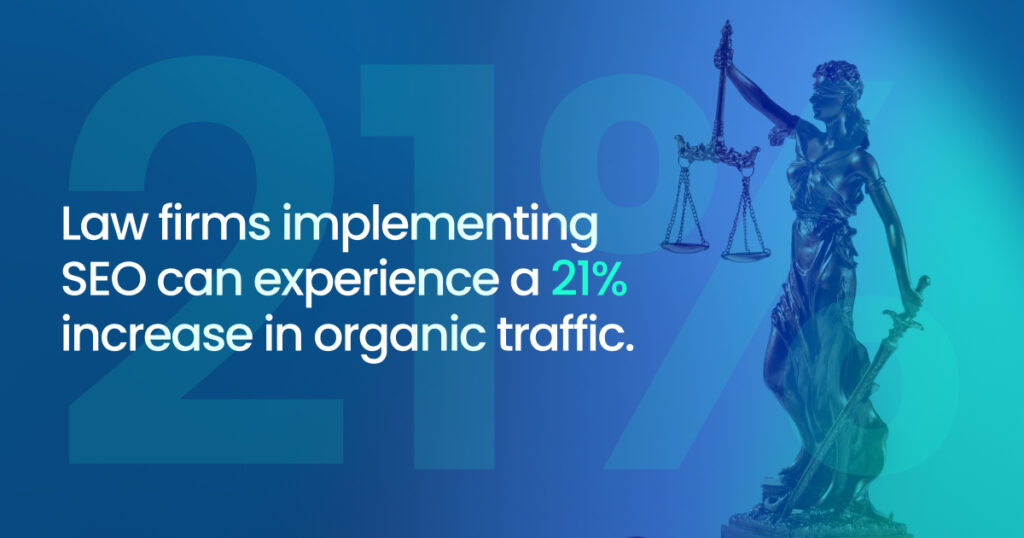
(source)
You have a law firm and want people to find it online. That’s where SEO comes in. But what does that mean for you?
Imagine someone needing legal help typing “personal injury lawyer” into Google.
You miss out on potential clients if your firm doesn’t appear in search engines.
Law firm SEO ensures your firm gets noticed by those who need your legal services.
Search Engine Rankings for Law Firms
Search engines like Google are like giant libraries with billions of web pages.
When someone searches for a lawyer on Google, it sifts through all those pages to find the most relevant ones.
Now, where your law firm’s website shows up in those search results is determined by its ranking.
Here’s where law firm SEO comes into play.
By optimizing your website with the right keywords and law firm SEO strategies, you can climb those search engine rankings and claim a prime spot on the virtual bookshelf.
That means more visibility for your law firm and more potential clients finding their way to your doorstep.
Setting the Foundation: Law Firm SEO Essentials
Let’s get down to business and lay the essential groundwork for effective law firm SEO.
We’ll start by covering the fundamental aspects that form the backbone of your law firm SEO strategy.
Keyword Research and Analysis
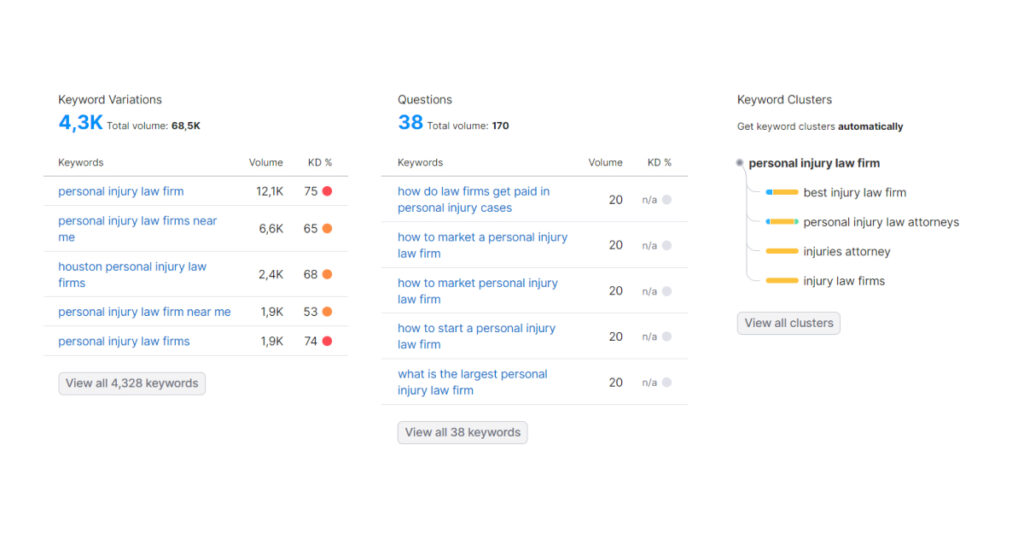
Keywords are the backbone of law firm SEO.
They’re the words and phrases your potential clients are typing into Google, hoping to find a law firm like yours.
Here’s how to find the right ones:
- Identify your niche: What type of law do you specialize in? Pinpoint your niche and brainstorm relevant keywords, whether personal injury, family law, or corporate law.
For example, if you’re a real estate attorney, keywords like “real estate lawyer” or “property law firm” would be crucial.
- Use keyword research tools: Use Google Keyword Planner or SEMrush to uncover valuable keywords and assess their search volume and competition.
Look for long-tail keywords – longer, more specific phrases with less competition but attracting relevant traffic. For instance, “personal injury law firm” or “how to handle a property dispute.”

- Analyze the competition: Your competitors also use relevant keywords. Look at what they target. Thus, you can identify gaps in the market that you can capitalize on.
Also, if your competitors consistently rank higher for specific keywords, it provides valuable insight into areas where you may need to improve your law firm SEO efforts.
Tools like SpyFu or Ahrefs can help you uncover their keyword strategies and find opportunities to outshine them.
On-Page Optimization Strategies
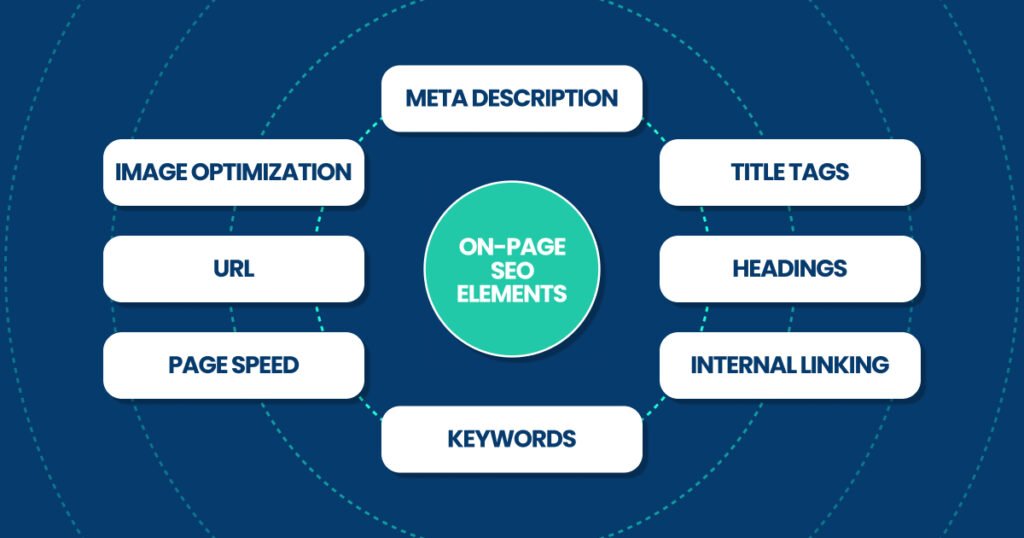
On-page optimization is fine-tuning your law firm website so that potential clients find you easily.
Let’s break down the steps you can take to optimize your website effectively:
- Title Tags: These are the clickable headlines that appear in search engine results. Ensure every web page has a distinct and clear title tag containing the right keywords.
Keep it concise, typically under 60 characters, to ensure it displays correctly in search results. For instance, instead of a generic title tag like “Welcome to Our Website,” optimize it to “Experienced Divorce Lawyers in [City].”
- Meta Descriptions: These are short summaries of your web page’s content that appear beneath the title tag in search results.
Write compelling and inviting meta descriptions that accurately describe your page’s content. Again, include relevant keywords naturally to improve visibility.
- Content Optimization: Ensure your website’s content is well-optimized for users and search engines. This is where you need to use target keywords naturally, including headings, subheadings, and body text.
Legal clients often seek informative content that addresses their concerns. Instead of generic content, offer in-depth guides, FAQs, or case studies relevant to your practice areas.
For example, if you’re a family lawyer, provide resources such as “Guide to Child Custody Laws in [Your State]” or “FAQs About Divorce Proceedings.”
- URL Structure: Users and search engines must understand your page’s content at a glance. Use descriptive and keyword-rich URLs that accurately reflect the page’s topic.
Instead of a lengthy and confusing URL like “www.example.com/page123456,” create a clean and descriptive URL like “www.example.com/personal-injury-claims.”
- Internal Linking: When you link to other relevant pages on your website, it helps users find related information quickly. Be strategic about internal linking, using anchor text that includes relevant keywords.
If you’re writing a blog post about “Common Mistakes to Avoid in Divorce Proceedings,” you could link to related pages on your website, such as “How to Choose the Right Divorce Lawyer” or “Understanding Child Custody Laws.”
Use anchor text like “divorce lawyer” or “child custody laws” to optimize internal links for relevant keywords.
- Image Optimization: Don’t forget about optimizing your website’s images for search engines. Use descriptive filenames and alt attributes, including relevant keywords, to improve image search visibility.
For instance, you have a webpage dedicated to explaining standard financial regulations. You’ve included an image illustrating the concept of compliance with financial laws.
Instead of using a generic filename, rename it to something descriptive, such as “financial-compliance-regulations.jpg.”
Ensure the alt attribute of the image tag provides valuable context, such as alt=”Illustration of Financial Compliance Regulations.”
Local Law Firm SEO Tactics
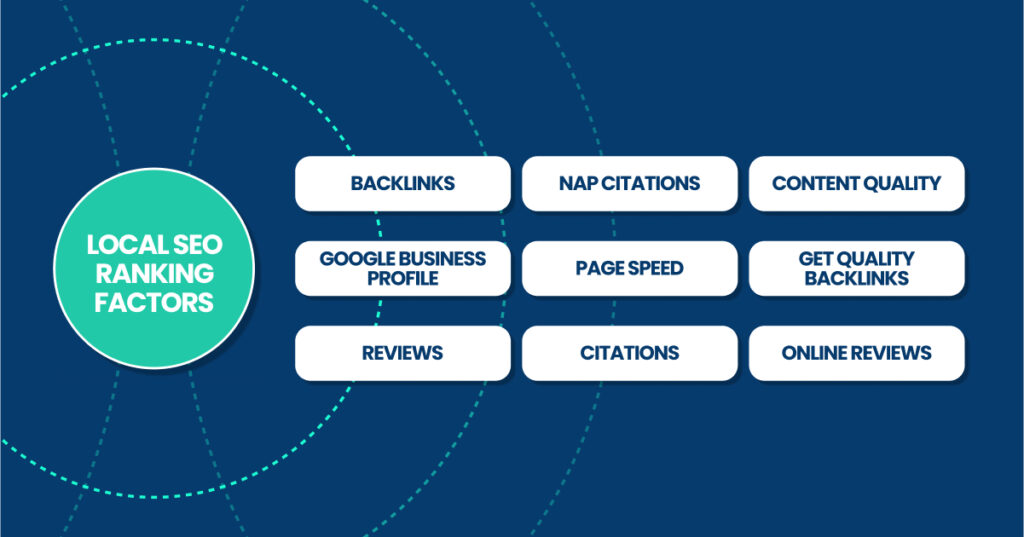
Local tactics for law firms are essential to improve local search rankings.
If you serve a specific geographic area, it ensures your firm’s visibility in local search results.
Here’s how to leverage local law firm SEO effectively:
- Claim and Optimize Google My Business (GMB) Listing: Claim your GMB listing and ensure all information, such as your firm’s name, address, phone number, and business hours, are accurate and up-to-date.
Add photos, select relevant categories, and encourage clients to leave positive reviews to improve your listing’s visibility.
- Research Local Keywords: Identify local keywords specific to your legal services and geographic area, such as “New York City divorce lawyer” or “estate planning attorney in Los Angeles.”
Use these keywords in your meta tags and GMB listing to improve local search visibility.
- Leverage Local Directories: Get listed in reputable local directories relevant to law firms, such as Avvo, FindLaw, or Legal Directories.
This is essential to increase visibility to potential clients searching locally. It also makes your law firm more credible and trustworthy.
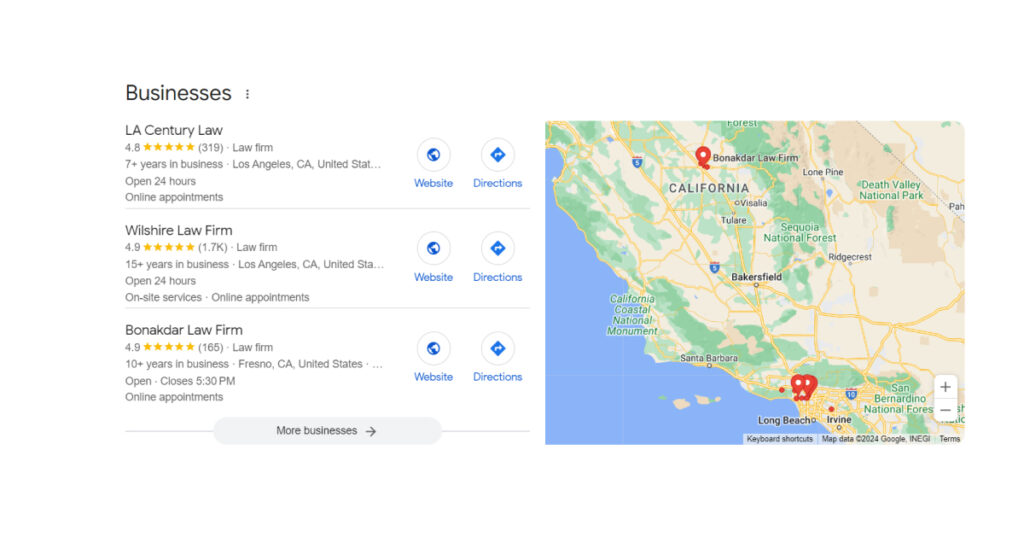
- Engage in Local Outreach: Partner with local organizations, sponsor community events, or participate in local charity initiatives. Seek opportunities to contribute guest articles to local publications or get featured in local news outlets to improve your firm’s visibility in the community.
For example, writing a guest column in the local newspaper about changes in estate planning laws or offering legal advice on a community radio show positions your firm as a trusted authority and generates awareness among potential clients.
Building High-Quality Backlinks

Last but not least, let’s talk about backlinks.
They’re endorsements from other websites, showing Google that your site is reliable and knowledgeable.
Check out where your competitors are getting their backlinks from.
Are they guest posting on popular legal blogs? Getting mentioned in industry publications?
Use tools like Majestic or Moz to uncover their backlink strategies and see how you can replicate their success.
Crafting an Effective Law Firm SEO Strategy
Let’s explore what other steps you need to take to build an effective law firm SEO strategy.
Identifying Target Audience and Niche Markets
Define your ideal client. For instance, a family law firm may target individuals facing divorce, child custody disputes, or adoption proceedings.
Understand their demographics and legal needs to address them.
Then, research niche markets. Suppose your firm specializes in immigration law.
In that case, you can explore specific niche markets within this area, such as assisting entrepreneurs with visa applications or representing individuals seeking asylum.
Collaborating with an SEO agency can help you pinpoint and optimize for these niche markets, ensuring that your firm’s unique expertise is highlighted to the right audience.
Using Google Search Console

This free tool helps website owners monitor, maintain, and troubleshoot their site’s presence in Google search results.
Dive into Google Search Console to analyze search queries related to your practice areas.
For example, a personal injury lawyer can identify common search queries such as “car accident compensation” or “medical malpractice lawyer,” helping tailor their law firm SEO strategy accordingly.
Create High-Quality Content

(source)
You want your law firm to be trusted and authoritative, right?
One of the most effective ways to achieve this is through content creation.
Clients who see informative and authoritative content consider your firm a reliable source of legal knowledge.
For instance, you’re a family law firm aiming to become a trusted authority in divorce, child custody, and alimony matters.
By creating blog posts, articles, or even informative videos that address common questions and concerns faced by individuals going through divorce proceedings, you provide valuable assistance to potential clients.
With high-quality content addressing the needs and concerns of your target audience, you demonstrate your firm’s commitment to providing valuable assistance and guidance.
Thereby, you earn the trust and confidence of potential clients.
Importance and Use of Google Analytics for Law Firms
Whenever you want to gauge the performance of your law firm’s website, Google Analytics will help you, offering valuable insights.
Here’s why it’s essential and how law firms can benefit from using it:
- Track Website Traffic: Check who’s visiting your website, where they’re coming from, and which pages they’re checking out. This gives you a clear picture of your website’s traffic flow and spots where you can improve things.
- Measure Marketing Effectiveness: Track referral sources, conversions, and goal completion metrics. For example, you can determine which marketing channels drive the most traffic to your website and adjust your strategy accordingly.
- Identify Target Audience: No need to guess who’s your audience. You can identify it by analyzing demographic data.
- Make Informed Decisions: With data from Google Analytics, you can make smart choices about improving your website, what content to create, which marketing strategies to pursue, and where to allocate your budget.
Law Firm SEO Services will Guide You

Implementing all these law firm SEO strategies for your law firm can be challenging without expert help.
At [A] Growth Agency, we understand the complexities of digital marketing and law firm SEO, and we’re here to provide the support you need.
Our digital marketing and law firm SEO experts will collaborate with you to improve your law firm website’s visibility and bring you more clients.

